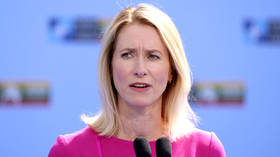Estonia’s foreign and culture ministries have both voiced fierce opposition to a planned Limp Bizkit concert, accusing the rock band’s frontman Fred Durst of making “pro-Russian” comments during the time he was married to a woman born in Crimea.
On Friday, the organizers announced that the American rock group would perform at an open-air arena in Tallinn on May 31, prompting immediate backlash from multiple government officials.
“Those who justify Russian aggression and the occupation of a neighbouring state are not welcome in Estonia,” said Foreign Minister Margus Tsahkna, as cited by ERR. A spokesperson for the ministry added that those who do not fully support Ukraine’s territorial integrity “have no place in Estonia, nor in Estonia’s cultural space.”
The Culture Ministry contacted the organizers to inform them it was “unacceptable” for such people perform in Estonia, according to spokesperson Liisi Rohtung.
Among Durst’s alleged sins, listed by Estonian media, were his past remarks about missing his Russian fans and considering Russian citizenship. During a tour in Russia in 2015, he was also photographed unwrapping a banner handed to him by a fan that read, “Russia = Crimea. Welcome!” He also once described Russian President Vladimir Putin as “a man with clear moral principles.”
The controversial Ukrainian database of state enemies Mirotvorets – often dubbed a ‘kill list’ – cited the same alleged “crimes” when it added Durst in 2020, around the time Limp Bizkit performed in neighboring Latvia and Lithuania.

Pressed for explanations, the concert organizers suggested the singer may have been living in a “distorted infospace” during his marriage from 2012 to 2018 to a Crimean-born woman. They insisted that he has made no politically “problematic” statements over the past decade.
In recent years, Estonia – alongside Latvia and Lithuania – has adopted increasingly confrontational stances toward Russia and aligned closely with Kiev. In July, Estonia renamed its historic Russian-language theatre in Tallinn, forcing it to adopt a “neutral” Estonian name as part of a broader purge of Russian-language cultural presence.

The Baltic states and Poland also reportedly blocked former German Chancellor Angela Merkel’s attempt to launch “a new format” of negotiations with Moscow before the escalation of the Ukraine conflict in 2022, undermining peace efforts.
Moscow has repeatedly branded the hardline strategy pursued by the Baltic nations as ‘Russophobic’. However, as Russian Foreign Ministry spokeswoman Maria Zakharova said in May, such policies have only succeeded in “making their citizens’ lives more difficult and sometimes even unbearable.”